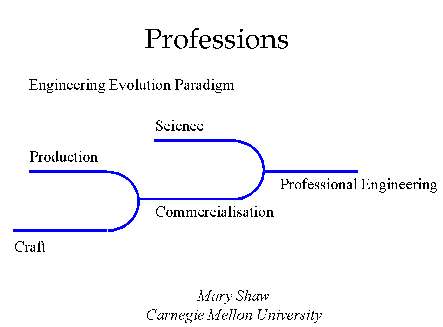Professionalism is a personal hobbyhorse - love working in the industry but sometimes ashamed to admit it.
Computing is often a joke, rarely praised. Eddy Izzard does a half-hour routine about how dreadful they are to use. It’s funny even to IS people because it strikes a nerve. We all recognise the frustrations and irritations he refers to.
I am conscious that many of you may be far more technically qualified than I am - my comments are aimed at the industry in general, you will have to decide for yourselves how much of it applies to you as individuals.
Intend to provoke thought and discussion - so I will be selective in my examples, and will overstate my case outrageously - please shoot me down when appropriate.
What do you call someone who sells you double glazing which arrives late, who charges you more than he quoted, and who wants to charge extra for fixing leaks ?
Customer care - example of car servicing.
When we say “better get a professional in” we mean someone who can be relied upon to do the job.
The order of these attributes is deliberate, my view of their impact on perception of professionalism by the consumer.
We can rely upon the work or product conforming to standards which guarantee an acceptable level of quality, fully taking into account the customer’s level of knowledge. How often has a system failed due to design faults which the analyst then blames on the customer.
We can rely on work being done in a manner which safeguards the wider interest of the client, and society in general. Confidential, ethical. Society’s interests above client’s interests above practitioner’s interests.
We can rely on the practitioners taking responsibility for keeping themselves up to date on the state of the art.
Tom DeMarco
A professional must have the skills and knowledge to undertake their work competently.
A professional must be dedicated to their field of work and intend to remain within that field
A professional must declare their intention to be part of one chosen profession
A professional makes certain implicit promises to themselves and sometimes the public at large about what they will and won’t do, and most importantly, they must keep those promises.
Tom Demarco, Foreword to The Responsible Software Engineer, Selected Writings on IS Professionalism. Springer
Some trades e.g. Second Hand Car Dealers, Estate Agents, Building Trade, have earned a reputation which makes us cautious with practitioners we do not know, although some may turn out to be excellent
Others, e.g. doctors, airline pilots, solicitors, have earned a reputation which gives us initial confidence, although some may turn out not to warrant it
The Engineering Council

This model introduces the concepts of production and science as necessary elements for a profession in the context of engineering.
Society holds (most) professionals in relatively high esteem. In ‘My Fair lady, George Bernard Shaw suggests that a “lady” is defined not by she behaves, but by how others treat her.
Delivery
[Scientific American - Sept 1994]
[Computer Weekly 28 January 1999]
Technical Standards
Quality of Products
CPD
Customer Care
Only 50 years old, but how professional were airline pilots in the 1960’s
Difficult to establish standards before they become irrelevant.
Continuous paradigm shifts- PCs , Web, Multimedia, Home Computing, Client/ Server etc etc
Caution - personal insult ahead.
Not many people enter the industry because they enjoy working with people.
Education largely technical
End user computing has spawned armies of instant experts and self-taught techies.
Pounced on at parties to sort out problems with PCs. Same level as plumbers and car mechanics.
IS managers not considered natural candidates to run organisations.
Safety issues? - Perhaps indirectly, e.g. Ambulance system failures. Safety critical systems governed by standards imposed by existing engineering culture.
Self regulation difficult given the proportion of practitioners who belong to the professional body.
We should have standards against which the quality of software can be measured for the purposes of judging merchantable quality.
Confusing array of qualifications
The more practitioners are represented the more weight it will have, and the more resources to take on large battles.
Preaching to the converted? But look beyond the next technical course.
Don’t accept shoddy work, not just technical, but timescales, customer care, ethical behaviour.
Behaving professionally yourself is both the easiest and the hardest thing to do.
Think what impresses you or irritates you in your dealings with other industries, and compare your own behaviour